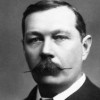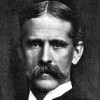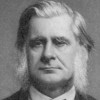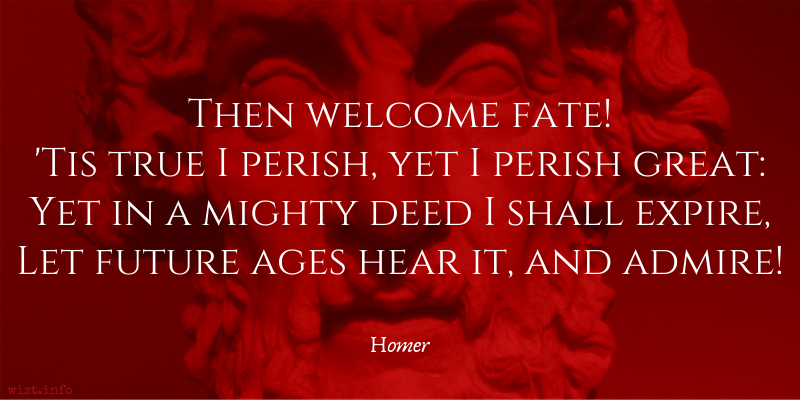The world would be much better off if the pains taken to analyze the subtlest moral laws were given to the practice of the simplest.
[Es stände besser um die Welt, wenn die Mühe, die man sich gibt, die subtilsten Moralgesetze auszuklüglen, zur Ausübung der einfachsten angewendet würde.]
Marie von Ebner-Eschenbach (1830-1916) Austrian writer
Aphorisms [Aphorismen], No. 104 (1880) [tr. Wister (1883)]
(Source)
(Source (German)). Alternate translation:
The world would be in better shape if people would take the same pains in the practice of the simplest moral laws as they exert in intellectualizing over the most subtle moral questions.
[tr. Scrase/Mieder (1994)]
Quotations about:
action
Note not all quotations have been tagged, so Search may find additional quotes on this topic.
Early to bed and early to rise, makes a man healthy wealthy and wise.
Benjamin Franklin (1706-1790) American statesman, scientist, philosopher, aphorist
Poor Richard (1735 ed.)
(Source)
Courage can’t see around corners but goes around them anyway.
Mignon McLaughlin (1913-1983) American journalist and author
The Neurotic’s Notebook, ch. 4 (1963)
(Source)
What we do is never understood but always only praised or censured.
[Was wir thun, wird nie verstanden, sondern immer nur gelobt und getadelt.]
Friedrich Nietzsche (1844-1900) German philosopher and poet
The Gay Science [Die fröhliche Wissenschaft], Book 3, § 264 (1882) [tr. Kaufmann (1974)]
(Source)
Also known as La Gaya Scienza, The Joyful Wisdom, or The Joyous Science.
(Source (German)). Alternate translations:
What we do is never understood, but only praised and blamed.
[tr. Common (1911)]
What we do is never understood but always merely praised and reproached.
[tr. Nauckhoff (2001)]
A grimy fly can soil the entire wall and a small, dirty little act can ruin the entire proceedings.
But if you have a fear of unpopularity, is that arising from the imputation of vigour and boldness, or that arising from that of inactivity and indecision most to be feared? When Italy is laid waste by war, when cities are attacked and houses in flames, do you not think that you will be then consumed by a perfect conflagration of hatred?
[Sed si quis est invidiae metus, non1 est vehementius severitatis ac fortitudinis invidia quam inertiae ac nequitiae pertimescenda. An, cum bello vastabitur Italia, vexabuntur urbes, tecta ardebunt, tum te non existimas invidiae incendio conflagraturum]
Marcus Tullius Cicero (106-43 BC) Roman orator, statesman, philosopher
Orationes in Catilinam [Catilinarian Orations], No. 1, § 11, cl. 29 (1.11.29) (63-11-08 BC) [tr. Yonge (1856)]
(Source)
Speaking (aloud, rhetorically) to himself about his concerns of public reaction to his acting so passionately against Cataline's conspiracy.
(Source (Latin)). Alternate translations:
But if there be any fear of Envy, is the Censure of Severity and Courage more greatly to be feared, than that of Baseness and Cowardise? Do you not think, when Italy shall be made desolate with War, the Cities plundered, the Houses a-fire, you shall then fall under a flagrant Envy?
[tr. Wase (1671)]
If fear is to operate, which do you think is most to be dreaded, reproach for cowardice, or censure for magnanimity? When Italy is laid waste; when her cities are taken by storm; when her temples and mansions are wrapt in flames; it is then your danger will begin; it is then that the clamours of mankind will be loud against you.
[tr. Sydney (1795)]
But if there is any fear of odium, whether should the odium resulting from severity and determinati0on be dreaded more violently than that of indolence and wickedness? Whether, when Italy shall be ravaged by war, when the cities shall be harassed, when roofs shall be burning, dost thou not think that thou then will burn with a conflagration of odium?
[tr. Mongan (1879)]
But if there is any fear of envy (displeasure), whether is the envy of severity and of fortitude to be feared more violently, than (that) of inactivity and of negligence? Whether, when Italy shall be devastated with war, cities shall be burned, roofs (houses) shall be on fire: dost thou think thyself not (to be) about to burn then with a conflagration of envy (unpopularity)?
[tr. Underwood (1885)]
But if there is any fear of ill will, is the ill will because of strictness and courage to be feared more strongly, than (that) because of inactivity and negligence? When Italy shall be devastated with war, cities shall be harassed, roofs [houses] shall burn: do you think (you) yourself will not (about to) be consumed then with a conflagration of ill will?
[tr. Dewey (1916)]
If the question of inviting disapproval arises at all, the unpopularity resulting from firmness and determination is no more to be dreaded than the opprobrium produced by culpable failure to act. For when Italy is to be ravaged by war, when cities are assaulted and houses gutted by fire, do you not see how utterly the flames of hatred will consume you then?
[tr. Grant (1960)]
But if there is any fear of hatred, it is not hatred of harshness and firmness requiring to be feared more violently than (hatred) of idleness and worthlessness. Or when Italy is laid waste to, the cities will be harassed, the buildings will burn, then do you not think that you will be consumed by burning hatred?
[IB Notes]
When we look forward and try to project what may come out of a development, we are always wrong, because the by-products sometimes become far more important than the primary thing you started out to accomplish. Nevertheless, unintelligent motion is a great deal more important in research than intelligent standing still.
Charles F. Kettering (1876-1958) American inventor, engineer, researcher, businessman
“250 at Luncheon Honor Kettering,” New York Times (1936-11-11)
(Source)
Fortune sumtimes shows us the way, but it iz energy that achieves sucksess.
[Fortune sometimes shows us the way, but it is energy that achieves success.]
Josh Billings (1818-1885) American humorist, aphorist [pseud. of Henry Wheeler Shaw]
Everybody’s Friend, Or; Josh Billing’s Encyclopedia and Proverbial Philosophy of Wit and Humor, ch. 131 “Affurisms: Plum Pits (1)” (1874)
(Source)
‘Tis the Glory and Merit of some men to write well, and of others not to write at all.
[La gloire ou le mérite de certains hommes est de bien écrire; et de quelques autres, c’est de n’écrire point.]Jean de La Bruyère (1645-1696) French essayist, moralist
The Characters [Les Caractères], ch. 1 “Of Works of the Mind [Des Ouvrages de l’Esprit],” § 59 (1.59) (1688) [Bullord ed. (1696)]
(Source)
(Source (French)). Alternate translations:
'Tis the Glory or the Merit of some Men to write well; and of others not to write at all.
[Curll ed. (1713)]
It is the Glory and Merit of some Men to write well, and of others not to write at all.
[Browne ed. (1752)]
It is the glory and the merit of some men to write well, and of others not to write at all.
[tr. Van Laun (1885)]
The glory or merit of certain men lies in writing well: that of certain others, in not writing at all.
[tr. Stewart (1970)]
I think nobody should be certain of anything. If you’re certain, you’re certainly wrong, because nothing deserves certainty, and so one ought always to hold all one’s beliefs with a certain element of doubt and one ought to be able to act vigorously in spite of the doubt.
Bertrand Russell (1872-1970) English mathematician and philosopher
Interview by Woodrow Wyatt, BBC TV (1959)
(Source)
Collected in Bertrand Russell's BBC Interviews (1959) [UK] and Bertrand Russell Speaks His Mind (1960) [US]. Reprinted (abridged) in The Humanist (1982-11/12), and in Russell Society News, #37 (1983-02).
A vast deal may be done by those who dare to act.
Self-respect cannot be hunted. It cannot be purchased. It is never for sale. It cannot be fabricated out of public relations. It comes to us when we are alone, in quiet moments, in quiet places, when we suddenly realize that, knowing the good, we have done it; knowing the beautiful, we have served it; knowing the truth, we have spoken it.
Whitney Griswold (1906–1963) American historian, educator [Alfred Whitney Griswold]
“Society’s Need for Man,” Baccalaureate Address, Yale University (1957-06-09)
(Source)
Goodness is about what you do. Not who you pray to.
But the greatest undertakings should not be overly pondered, lest contemplation of difficulties too clearly foreseen appall you.
[Los grandes empeños aun no se han de pensar, basta ofrecerse, porque la dificultad, advertida, no ocasione el reparo.]
Baltasar Gracián y Morales (1601-1658) Spanish Jesuit priest, writer, philosopher
The Art of Worldly Wisdom [Oráculo Manual y Arte de Prudencia], § 204 (1647) [tr. Fischer (1937)]
(Source)
(Source (Spanish)). Alternate translations:
As to great enterprizes, we must not stand reasoning, it is enough that we embrace them when they present, lest the consideration of their difficulty make us abandon the attempt.
[Flesher ed. (1685)]
Great undertakings are not to be brooded over, lest their difficulty when seen causes despair.
[tr. Jacobs (1892)]
In moments of great danger, don't even think, simply act. Don't dwell on the difficulties.
[tr. Maurer (1992)]
Every man’s last day is fixed.
Lifetimes are brief and not to be regained,
For all mankind. But by their deeds to make
Their fame last: that is labor for the brave.[Stat sua cuique dies, breve et inreparabile tempus
Omnibus est vitae; sed famam extendere factis,
Hoc virtutis opus.]Virgil (70-19 BC) Roman poet [b. Publius Vergilius Maro; also Vergil]
The Aeneid [Ænē̆is], Book 10, l. 467ff (10.467-69) [Jove] (29-19 BC) [tr. Fitzgerald (1981)]
(Source)
Jove, to Alcides (Hercules), comforting him on the pending, but brave, death of Pallas.
(Source (Latin)). Alternate translations:
Each hath his fate; Short and irreparable time
Man's life enjoyes: But by brave deeds to clime
To honour's height, this they by valour gain.
[tr. Ogilby (1649)]
Short bounds of life are set to mortal man.
'Tis virtue's work alone to stretch the narrow span.
[tr. Dryden (1697)]
To every one his day is fixed: a short and irretrievable term of life is given to all: but by deeds to lengthen out fame, this is virtue's task.
[tr. Davidson/Buckley (1854)]
Each has his destined time: a span
Is all the heritage of man:
'Tis virtue's part by deeds of praise
To lengthen fame through after days.
[tr. Conington (1866)]
To every one his day
Stands fixed by fate. The term of mortal life
Is brief, and irretrievable to all.
But to extend the period of its fame
By noble actions, this is virtue's work.
[tr. Cranch (1872), l. 615ff]
Each hath his own appointed day; short and irrecoverable is the span of life for all: but to spread renown by deeds is the task of valour.
[tr. Mackail (1885)]
His own day bideth every man; short space that none may mend
Is each man's life: but yet by deeds wide-spreading fame to send,
Man's valour hath this work to do.
[tr. Morris (1900)]
Each hath his day; irreparably brief
Is mortal life, and fading as the leaf.
'Tis valour's part to bid it bloom anew
By deeds of fame.
[tr. Taylor (1907), st. 63, l. 562ff]
To each his day is given. Beyond recall
man's little time runs by: but to prolong
life's glory by great deeds is virtue's power.
[tr. Williams (1910)]
Each has his day appointed; short and irretrievable is the span of life to all: but to lengthen fame by deeds -- that is valour's task.
[tr. Fairclough (1918)]
Every man, my son,
Has his appointed time; life’s day is short
For all men; they can never win it back,
But to extend it further by noble deeds
Is the task set for valor.
[tr. Humphries (1951)]
Every man's hour is appointed. Brief and unalterable
For all, the span of life. To enlarge his fame by great deeds
Is what the brave man must aim at.
[tr. Day-Lewis (1952)]
Each has his day; there is, for all, a short,
irreparable time of life; the task
of courage: to prolong one's fame by acts.
[tr. Mandelbaum (1971), l. 648ff]
Each man has his allotted day. All life is brief and time once past can never be restored. But the task of the brave man is to enlarge his fame by his actions.
[tr. West (1990)]
Every man has his day, the course
of life is brief and cannot be recalled: but virtue’s task
is this, to increase fame by deeds.
[tr. Kline (2002)]
Each man has his day, and the time of life
is brief for all, and never comes again.
But to lengthen out one’s fame with action,
that’s the work of courage.
[tr. Fagles (2006), l. 553ff]
The day of death awaits all men; their time is brief and comes just once. But they can prolong their fame by action. This is the task of valor.
[tr. Bartsch (2021)]
I have no desire to make mysteries, but it is impossible at the moment of action to enter into long and complex explanations.
Arthur Conan Doyle (1859-1930) British writer and physician
“The Dancing Men” [Sherlock Holmes], The Strand Magazine (Dec 1903)
(Source)
Reprinted as "The Adventure of the Dancing Men" in The Return of Sherlock Holmes, ch. 3 (1905).
You may force men, by interest or punishment, to say or swear they believe, and to act as if they believed; you can go no farther.
But merely to possess virtue as you would an art is not enough, unless you apply it. For an art, even if unused, can still be retained in the form of theoretical knowledge, but virtue depends entirely upon its use.
[Nec vero habere virtutem satis est quasi artem aliquam, nisi utare; etsi ars quidem, cum ea non utare, scientia tamen ipsa teneri potest, virtus in usu sui tota posita est.]
Marcus Tullius Cicero (106-43 BC) Roman orator, statesman, philosopher
De Re Publica [On the Republic, On the Commonwealth], Book 1, ch. 2 / sec. 2 (1.2) (54-51 BC) [tr. Sabine/Smith (1929)]
(Source)
(Source (Latin)). Alternate translations:
Yet to possess virtue, like some art, without exercising it, is insufficient. Art indeed, when not effective, is still comprehended in science. The efficacy of all virtue consists in its use.
[tr. Featherstonhaugh (1829)]
Nor is it sufficient to possess this virtue as if it were some kind of art, unless we put it in practice. An art, indeed, though not exercised, may still be retained in knowledge; but virtue consists wholly in its proper use and action.
[tr. Yonge (1853)]
It is not enough to possess virtue, as though it were an art, unless we use it. For although, if you do not practice an art, you may yet retain it theoretically, the whole of virtue is centered in the exercise of virtue.
[ed. Harbottle (1906)]
But it is not enough to possess virtue, as if it were an art of some sort, unless you make use of it. Though it is true that an art, even if you never use it, can still remain in your possession by the very fact of your knowledge of it, yet the existence of virtue depends entirely upon its use.
[tr. Keyes (1928)]
Yet it is not enough to possess moral excellence as a kind of skill, unless you put it into practice. You can have a skill simply by knowing how to practise it, even if you never do; whereas moral excellence is entirely a matter of practice.
[tr. Rudd (1998)]
Furthermore, virtue is not some kind of knowledge to be possessed without using it: even if the intellectual possession of knowledge can be maintained without use, virtue consists entirely in its employment.
[tr. Zetzel (1999)]
Truly it is not enough to have virtue, as if it wer some sort of art, unless you use it. In fact, even if an art can be grasped by knowledge itself without using it, virtue depends wholly upon its use.
[tr. Fott (2014)]
It is not enough simply to possess virtue, as though it were a skill, unless you use it. Even a skill can be maintained through disuse by knowledge itself, but the entirety of virtue consists of its use.
[tr. Robinson (2016)]
Anyway, one of the first things you learn in space is not to thrash. If you have nothing constructive to do, the most constructive thing you can do is often nothing at all. In a mindful sense, I mean. Thrashing is the thing that gets people killed. Not sitting still.
Elizabeth Bear (b. 1971) American author [pseud. for Sarah Bear Elizabeth Wishnevsky]
Ancestral Night (2019)
(Source)
He that will not when he may,
When he will he shall have nay.Robert Burton (1577-1640) English scholar
Anatomy of Melancholy, Part 3, sec. 2, member 5, subsec. 5 (1621, 2nd ed.)
(Source)
When you see something that is not right, not just, not fair, you have a moral obligation to say something, to do something. Our children and their children will ask us, “What did you do? What did you say?” For some, this vote may be hard. But we have a mission and a mandate to be on the right side of history.
John Lewis (1940-2020) American politician and civil rights leader
Speech, House of Representatives (18 Dec 2019)
(Source)
During the House vote to impeach Donald Trump.
People keep telling me they are frustrated and ask, “What can I do?” I say organize, get registered, and vote like you’ve never voted before.
John Lewis (1940-2020) American politician and civil rights leader
Twitter (15 Mar 2016)
(Source)
Lewis used the phrase multiple times in his career.
Without being forgiven, released from the consequences of what we have done, our capacity to act would, as it were, be confined to one single deed from which we could never recover; we would remain victims of its consequences forever, not unlike the sorcerer’s apprentice who lacked the magic formula to break the spell.
Hannah Arendt (1906-1975) German-American philosopher, political theorist
The Human Condition, Part 5, ch. 33 (1958)
(Source)
It is our choices, Harry, that show what we truly are, far more than our abilities.
Joanne "Jo" Rowling (b. 1965) British novelist [writes as J. K. Rowling and Robert Galbraith]
Harry Potter and the Chamber of Secrets [Dumbledore] (1998)
(Source)
KEATING: Now I would like you to step forward over here and peruse some of the faces from the past. You’ve walked past them many times. I don’t think you’ve really looked at them. They’re not that different from you, are they? Same haircuts. Full of hormones, just like you. Invincible, just like you feel. The world is their oyster. They believe they’re destined for great things, just like many of you. Their eyes are full of hope, just like you.
Did they wait until it was too late to make from their lives even one iota of what they were capable? Because, you see gentlemen, these boys are now fertilizing daffodils. But if you listen real close, you can hear them whisper their legacy to you. Go on, lean in. Listen, you hear it?
Carpe. Carpe diem. Seize the day, boys, make your lives extraordinary.
Why have I always told you that the greatest way to change the world is to secretly commit little acts of compassion? It does not matter that people know what you are doing, but rather that you do it. When a large enough number of people finally do something, or something is done enough times, be it prayer or vegetarianism or whatever, it will then happen everywhere, to everyone. It will suddenly seem just normal. […] You must behave as if your every act, even the smallest, impacted a thousand people for a hundred generations. Because it does.
Thomas "Thom" Hartmann (b. 1951) American broadcaster, psychotherapist, businessman, political commentator
The Prophet’s Way: A Guide to Living in the Now, “The Hundredth Monkey” (1997)
(Source)
Often quoted as:
The most powerful way to change the world is to secretly commit little acts of compassion. You must behave as if your every act, even the smallest, impacted a thousand people for a hundred generations. Because it does.
In the mirrors of the many judgments, my hands are the color of blood. I am part of the evil that exists in the world and in Shadow. I sometimes fancy myself an evil which exists to oppose other evils […] and on that Great Day of which the prophets speak but in which they do not truly believe, on the day the world is utterly cleansed of evil, then I too will go down into darkness, swallowing curses. Perhaps even sooner than that, I now judge. But whatever … Until then, I will not wash my hands nor let them hang useless.
“There’s a right thing to do,” Holden said.
“You don’t have a right thing, friend,” Miller said. “You’ve got a whole plateful of maybe a little less wrong.”
Daniel Abraham (b. 1969) American writer [pseud. James S. A. Corey (with Ty Franck), M. L. N. Hanover]
Leviathan Wakes, ch. 36 (2011) [with Ty Franck]
(Source)
“Faith, hope, and charity, these three; but the greatest of these is charity.”
There is a deeper meaning in this text than we at first see. Of “these three,” two concern ourselves; the third concerns others. When faith and hope fail, as they do sometimes, we must try charity, which is love in action. We must speculate no more on our duty, but simply do it. When we have done it, however blindly, perhaps Heaven will show us the reason why.
Dinah Craik (1826-1887) English novelist and poet [b. Dinah Maria Mulock]
Christian’s Mistake, ch. 2 (1865)
(Source)
A reference to the Bible, 1 Cor. 13:13, the "Three Theological Virtues."
Something must happen — and that explains most human commitments. Something must happen, even loveless slavery, even war or death.
Albert Camus (1913-1960) Algerian-French novelist, essayist, playwright
The Fall [La Chute] (1956) [tr. O’Brien]
(Source)
Once divested of missionary virus, the cult of our gods gives no offense. It would be a peaceful age if this were recognized, and religion, Christian, communist or any other, were to rely on practice and not on conversion for her growth.
Freya Stark (1893-1993) Franco-British explorer, travel writer [Freya Madeline Stark]
Ionia: A Quest, ch. 17 (1954)
(Source)
What we do belongs to what we are; and what we are is what becomes of us.
In this world a man must either be an anvil or a hammer.
Henry Wadsworth Longfellow (1807-1882) American poet
Hyperion, “The Story of Brother Bernardus” (1839)
(Source)
The Intellect engages us in the pursuit of Truth. The Passions impel us to Action.
[Cogitatio in vero exquirendo maxime versatur, appetitus impellit ad agendum.]
Marcus Tullius Cicero (106-43 BC) Roman orator, statesman, philosopher
De Officiis [On Duties; On Moral Duty; The Offices], Book 1, ch. 35 (1.35) / sec. 132 (44 BC) [Barnes (1814)]
(Source (Latin)). Alternate translation:
Reflection is chiefly employed in the investigation of truth, appetite impels to action.
[tr. McCartney (1798)]
Reflection chiefly applies itself in the search of truth. Appetite prompts us to action.
[tr. Edmonds (1865)]
Thought is occupied chiefly in seeking the truth; impulse urges to action.
[tr. Peabody (1883)]
Thought is employed in the discovery of truth, appetite impels to action.
[tr. Gardiner (1899)]
Thought is occupied chiefly with the discovery of truth; impulse prompts to action.
[tr. Miller (1913)]
Thought is mostly expended in seeking out the truth, passion urges men to action.
[tr. Edinger (1974)]
I hope that in this year to come, you make mistakes.
Because if you are making mistakes, then you are making new things, trying new things, learning, living, pushing yourself, changing yourself, changing your world. You’re doing things you’ve never done before, and more importantly, you’re Doing Something.
So that’s my wish for you, and all of us, and my wish for myself. Make New Mistakes. Make glorious, amazing mistakes. Make mistakes nobody’s ever made before. Don’t freeze, don’t stop, don’t worry that it isn’t good enough, or it isn’t perfect, whatever it is: art, or love, or work or family or life.
Whatever it is you’re scared of doing, Do it.
Make your mistakes, next year and forever.Neil Gaiman (b. 1960) British author, screenwriter, fabulist
Blog entry (2011-12-31), “My New Year Wish”
(Source)
Don’t be a man of “Intentions.” The world gives a man credit only for his deeds and, often, not even for them.
Minna Antrim (1861-1950) American epigrammatist, writer
Don’ts for Bachelors and Old Maids (1908)
(Source)
Women are good listeners, but it’s a waste of time telling your troubles to a man unless there is something specific you want him to do.
Mignon McLaughlin (1913-1983) American journalist and author
The Neurotic’s Notebook, ch. 3 (1963)
(Source)
In a word, our moral dispositions are formed as a result of the corresponding activities. Hence it is incumbent on us to control the character of our activities, since on the quality of these depends the quality of our dispositions. It is therefore not of small moment whether we are trained from childhood in one set of habits or another; on the contrary it is of very great, or rather of supreme, importance.
[καὶ ἑνὶ δὴ λόγῳ ἐκ τῶν ὁμοίων ἐνεργειῶν αἱ ἕξεις γίνονται. διὸ δεῖ τὰς ἐνεργείας ποιὰς ἀποδιδόναι: κατὰ γὰρ τὰς τούτων διαφορὰς ἀκολουθοῦσιν αἱ ἕξεις. οὐ μικρὸν οὖν διαφέρει τὸ οὕτως ἢ οὕτως εὐθὺς ἐκ νέων ἐθίζεσθαι, ἀλλὰ πάμπολυ, μᾶλλον δὲ τὸ πᾶν.]
Aristotle (384-322 BC) Greek philosopher
Nicomachean Ethics [Ἠθικὰ Νικομάχεια], Book 2, ch. 1 (2.1, 1103b.20ff) (c. 325 BC) [tr. Rackham (1934), sec. 7-8]
(Source)
(Source (Greek)). Alternate translations:
Or, in one word, the habits are produced from the acts of working like to them: and so what we have to do is to give a certain character to these particular acts, because the habits formed correspond to the differences of these. So then, whether we are accustomed this way or that straight from childhood, makes not a small but an important difference, or rather I would say it makes all the difference.
[tr. Chase (1847)]
And indeed, in a word, all habits are formed by acts of like nature to themselves. And hence it becomes our duty to see that our acts are of a right character. For, as our acts vary, our habits will follow in their course. It makes no little difference, then, to what kind of habituation we are subjected from our youth up; but it is, on the contrary, a matter that is important to us, or rather all-important.
[tr. Williams (1869), sec. 24]
In a word moral states are the results of activities corresponding to the moral states themselves. It is our duty therefore to give a certain character to the activities, as the moral states depend upon the differences of the activities. Accordingly, the difference between one training of the habits and another from early days is not a light matter, but is serious or rather all-important.
[tr. Welldon (1892)]
In a word, acts of any kind produce habits or characters of the same kind. Hence we ought to make sure that our acts be of a certain kind; for the resulting character varies as they vary. It makes no small difference, therefore, whether a man be trained from his youth up in this way or in that, but a great difference, or rather all the difference.
[tr. Peters (1893)]
Thus, in one word, states of character arise out of like activities. This is why the activities we exhibit must be of a certain kind; it is because the states of character correspond to the differences between these. It makes no small difference, then, whether we form habits of one kind or of another from our very youth; it makes a very great difference, or rather all the difference.
[tr. Ross (1908)]
In a word, then, states come about from activities that are similar to them. That is why the activities must exhibit a certain quality, since the states follow along in accord with the differences between these. So it makes no small difference whether people are habituated in one way or in another way straight from childhood; on the contrary, it makes a huge one -- or rather, all the difference.
[tr. Reeve (1948)]
In short, it is by similar activities that habits are developed in men; and in view of this, the activities in which men are engaged should be of [the right] quality, for the kinds of habits which develop follow the corresponding differences in these activities. So in acquiring habit it makes no small difference whether we are acting in one way or on the contrary way right from our early youth; it makes a great difference, or rather all the difference.
[tr. Apostle (1975)]
In a word, then, like activities produce like dispositions. Hence we must give our activities a certain quality, because it is their characteristics that determine the resulting dispositions. So it is a matter of no little importance what sort of habits we form from the earliest age -- it makes a vast difference, or rather all the difference in the world.
[tr. Thomson/Tredennick (1976)]
In a word, then, like states arise from like activities. This is why we must give a certain character to our activities, since it is on the differences between them that the resulting states depend. So it is not unimportant how we are habituated from our early days; indeed it makes a huge difference -- or rather all the difference.
[tr. Crisp (2000)]
And so, in a word, the characteristics come into being as a result of the activities akin to them. Hence we must make our activities be of a certain quality, for the characteristics correspond to the differences among the activities. It makes no small difference, then, whether one is habituated to this or that way straight from childhood but a very great difference -- or rather the whole difference.
[tr. Bartlett/Collins (2011)]
But the many do not act upon this rule; they rather betake themselves to mere talk about what is right, deluding themselves into the belief that they are philosophers, and are consequently upon the high road to virtue; but, in reality, acting not unlike a sick man who listens attentively to his physicians, and then carries out none of their advice.
[ἀλλ᾽ οἱ πολλοὶ ταῦτα μὲν οὐ πράττουσιν, ἐπὶ δὲ τὸν λόγον καταφεύγοντες οἴονται φιλοσοφεῖν καὶ οὕτως ἔσεσθαι σπουδαῖοι, ὅμοιόν τι ποιοῦντες τοῖς κάμνουσιν, οἳ τῶν ἰατρῶν ἀκούουσι μὲν ἐπιμελῶς, ποιοῦσι δ᾽ οὐδὲν τῶν προσταττομένων. ὥσπερ οὖν οὐδ᾽ ἐκεῖνοι εὖ ἕξουσι τὸ σῶμα οὕτω θεραπευόμενοι, οὐδ᾽ οὗτοι τὴν ψυχὴν οὕτω φιλοσοφοῦντες.]
Aristotle (384-322 BC) Greek philosopher
Nicomachean Ethics [Ἠθικὰ Νικομάχεια], Book 2, ch. 4 (2.4, 1105b.12) (c. 325 BC) [tr. Williams (1869)]
(Source)
On practicing virtuous acts to become virtuous. (Source (Greek)). Alternate translations:
Yet people in general do not perform these actions, but taking refuge in talk they flatter themselves they are philosophising, and that they will so be good men: acting in truth very like those sick people who listen to the doctor with great attention but do nothing that he tells them.
[tr. Chase (1847), ch. 3]
But most people, instead of doing such actions, take refuge in theorizing; they imagine that they are philosophers and that philosophy will make them virtuous; in fact they behave like people who listen attentively to their doctors but never do anything that their doctors tell them.
[tr. Welldon (1892)]
But most men, instead of doing thus, fly to theories, and fancy that they are philosophizing and that this will make them good, like a sick man who listens attentively to what the doctor says and then disobeys all his orders.
[tr. Peters (1893)]
But most people do not do these, but take refuge in theory and think they are being philosophers and will become good in this way, behaving somewhat like patients who listen attentively to their doctors, but do none of the things they are ordered to do.
[tr. Ross (1908)]
But the mass of mankind, instead of doing virtuous acts, have recourse to discussing virtue, and fancy that they are pursuing philosophy and that this will make them good men. In so doing they act like invalids who listen carefully to what the doctor says, but entirely neglect to carry out his prescriptions.
[tr. Rackham (1934), ch. 4, sec. 6]
Ordinary people, however, do not do these actions but, taking refuge in argument, think that they are doing philosophy and that this is the way to become excellent -- thus behaving a bit like sick people who listen carefully to their doctors but do none of the things that are prescribed.
[tr. Reeve (1948)]
Yet most men do not do these; instead, they resort to merely talking about them and think that they are philosophizing and that by so doing they will become virtuous, thus behaving somewhat like patients who listen to their doctors attentively but do none of the things they are ordered to do.
[tr. Apostle (1975)]
This is not, however, the course that moes people follow: they have recourse to their principle, and imagine that they are being philosophical and that in this way they will become serious-minded -- behaving rather like invalids who listen carefully to their doctor, but carry out none of his instruction.
[tr. Thomson/Tredennick (1976)]
The many, however, do not do these actions but take refuge in arguments, thinking that they are doing philosophy, and that this is the way to become excellent people. In this they are like a sick person who listens attentively to the doctor, but acts on none of his instructions.
[tr. Irwin/Fine (1995)]
But the masses do not do them. They take refuge in argument, thinking that they are being philosophers and that this is the way to be good. they are rather like patients who listen carefully to their doctors, but do not do what they are told.
[tr. Crisp (2000)]
Yet most people [or the many] do not do them; and, seeking refuge in argument, they suppose that they are philosophizing and that they will in this way be serious, thereby doing something similar to the sick who listen attentively to their physicians but do nothing prescribed.
[tr. Bartlett/Collins (2011)]
Boasts are wind and deeds are hard.
Isaac Asimov (1920-1992) Russian-American author, polymath, biochemist
Foundation and Empire, ch. 22 (1952)
(Source)
As in the Olympic Games it is not the most attractive and the strongest who are crowned, but those who compete (since it is from this group that winners come), so in life it is those who act rightly who will attain what is noble and good.
[ὥσπερ δ᾽ Ὀλυμπίασιν οὐχ οἱ κάλλιστοι καὶ ἰσχυρότατοι στεφανοῦνται ἀλλ᾽ οἱ ἀγωνιζόμενοι (τούτων γάρ τινες νικῶσιν), οὕτω καὶ τῶν ἐν τῷ βίῳ καλῶν κἀγαθῶν οἱ πράττοντες ὀρθῶς ἐπήβολοι γίνονται.]
Aristotle (384-322 BC) Greek philosopher
Nicomachean Ethics [Ἠθικὰ Νικομάχεια], Book 1, ch. 9 (1.9, 1099a.4) (c. 325 BC) [tr. Crisp (2000)]
(Source)
(Source (Greek)). Alternate translations:
And as at the Olympic games it is not the finest and strongest men who are crowned, but they who enter the lists, for out of these the prize-men are selected; so too in life, of the honourable and the good, it is they who act who rightly win the prizes.
[tr. Chase (1847), ch. 6]
For as at the Olympic games it is not the fairest and the strongest who are crowned, but they that run -- for some of these it is that win the victory -- so too, among the noble and good in life, it is they that act rightly who become masters of life's prize.
[tr. Williams (1869)]
As in the Olympian games it is not the most beautiful and strongest persons who receive the crown, but they who actually enter the lists as combatants -- for it is some of these who become victors -- so it is they who act rightly that attain what is noble and good in life.
[tr. Welldon (1892), ch. 9]
And as at the Olympic games it is not the fairest and strongest who receive the crown, but those who contend (for among these are the victors), so in life, too, the winners are those who not only have all the excellences, but manifest these in deed.
[tr. Peters (1893)]
And as in the Olympic Games it is not the most beautiful and the strongest that are crowned but those who compete (for it is some of these that are victorious), so those who act win, and rightly win, the noble and good things in life.
[tr. Ross (1908)]
And just as at the Olympic games the wreaths of victory are not bestowed upon the handsomest and strongest persons present, but on men who enter for the competitions -- since it is among these that the winners are found, -- so it is those who act rightly who carry off the prizes and good things of life.
[tr. Rackham (1934), ch. 8, sec. 9]
And just as in the Olympic Games it is not the noblest and strongest who get the victory crown but the competitors (since it is among these that the ones who win are found), so also among the noble and good aspects of life it is those who act correctly who win the prizes.
[tr. Reeve (1948)]
And as at the Olympic Games it is not the most beautiful or the strongest who are crowned but those who compete (for it is some of these who become victors), so in life it is those who act rightly who become the winners of good and noble things.
[tr. Apostle (1975), ch. 9]
Just as at the Olympic Games it is not the best-looking or the strongest men present that are crowned with wreaths, but the competitors (because it is from them that the winners come), so it is those who act that rightly win the honors and rewards in life.
[tr. Thomson/Tredennick (1976)]
For just as it is not the noblest and strongest who are crowned with the victory wreath at the Olympic Games but rather the competitors (for it is certain of these who win), so also it is those who act correctly who attain the noble and good things in life.
[tr. Bartlett/Collins (2011)]
I was waiting for
something extraordinary to
happenbut as the years wasted on
nothing ever did unless I
caused itCharles Bukowski (1920-1994) German-American author, poet
“two kinds of hell” (c. 1990)
(Source)
While this sounds motivational, in the context of the poem, the "extraordinary" things (bar fights, dalliances) always end up poorly.
First published in Third Lung Review, #8 (1992); collected in an edited version in The People Look Like Flowers at Last (2007).
If the desire to write is not accompanied by actual writing, then the desire must be not to write.
Much misconstruction of character arises out of our habit of assigning a motive for every action — whereas a good many of our acts are performed without any motive.
Christian Nestell Bovee (1820-1904) American epigrammatist, writer, publisher
Intuitions and Summaries of Thought, Vol. 2 (1862)
(Source)
The moral case for intervention is only as strong as the practicality of the mission itself. There is no moral case for doing something you’re not capable of doing.
Dexter Filkins (b. 1961) American journalist
“The Moral Logic of Humanitarian Intervention,” New Yorker (16 Sep 2019)
(Source)
You must make up your mind to act decidedly and take the consequences. No good is ever done in this world by hesitation.
T. H. Huxley (1825-1895) English biologist [Thomas Henry Huxley]
Letter to Anton Dohrn (1873-10-17)
(Source)
Then welcome fate!
‘Tis true I perish, yet I perish great:
Yet in a mighty deed I shall expire,
Let future ages hear it, and admire![νῦν αὖτέ με μοῖρα κιχάνει.
μὴ μὰν ἀσπουδί γε καὶ ἀκλειῶς ἀπολοίμην,
ἀλλὰ μέγα ῥέξας τι καὶ ἐσσομένοισι πυθέσθαι.]Homer (fl. 7th-8th C. BC) Greek author
The Iliad [Ἰλιάς], Book 22, l. 303ff (22.303) [Hector] (c. 750 BC) [tr. Pope (1715-20), l. 385ff]
(Source)
Original Greek. Alternate translations:
But Fate now conquers; I am hers; and yet not she shall share
In my renown; that life is left to every noble spirit,
And that some great deed shall beget that all lives shall inherit.
[tr. Chapman (1611), l. 266ff]
But I will not fall
Inglorious; I will act some great exploit
That shall be celebrated ages hence.
[tr. Cowper (1791), l. 347ff]
Fate overtakes me. Nevertheless I will not perish cowardly and ingloriously at least, but having done some great deed to be heard of even by posterity.
[tr. Buckley (1860)]
My fate hath found me now.
Yet not without a struggle let me die,
Nor all inglorious; but let some great act,
Which future days may hear of, mark my fall.
[tr. Derby (1864)]
Now my fate hath found me. At least let me not die without a struggle or ingloriously, but in some great deed of arms whereof men yet to be born shall hear.
[tr. Leaf/Lang/Myers (1891)]
My doom has come upon me; let me not then die ingloriously and without a struggle, but let me first do some great thing that shall be told among men hereafter.
[tr. Butler (1898)]
Now again is my doom come upon me. Nay, but not without a struggle let me die, neither ingloriously, but in the working of some great deed for the hearing of men that are yet to be.
[tr. Murray (1924)]
But now my death is upon me. Let me at least not die without a struggle, inglorious, but do some big thing first, that men to come shall know of it.
[tr. Lattimore (1951)]
Now the appointed time's upon me. Still, I would not die without delivering a stroke, or die ingloriously, but in some action memorable to men in days to come.
[tr. Fitzgerald (1974)]
So now I meet my doom. Well let me die --
but not without struggle, not without glory, no,
in some great clash of arms that even men to come
will hear of down the years!
[tr. Fagles (1990), l. 359ff]
But now has my doom overcome me. But let me at least not die without making a fight, without glory, but a great deed having done for the men of the future to hear of.
[tr. Merrill (2007)]
May I not die without a fight and without glory
but after doing something big for men to come to learn about.
[tr. @Sentantiq (2011)]
You can tell the man who rings true from the man who rings false, not by his deeds alone, but also by his desires.
[Δόκιμος ἀνὴρ καὶ ἀδόκιμος οὐκ ἐξ ὧν πράσσει μόνον, ἀλλὰ καὶ ἐξ ὧν βούλεται.]
Democritus (c. 460 BC - c. 370 BC) Greek philosopher
Frag. 68 (Diels) [tr. Bakewell (1907)]
(Source)
Diels citation "68. (40 N.) DEMOKRATES. 33." Bakewell lists this under "The Golden Sayings of Democritus." Freeman notes this as one of the Gnômae, from a collection called "Maxims of Democratês," but because Stobaeus quotes many of these as "Maxims of Democritus," they are generally attributed to the latter.
Alternate translations:
- "A man is approved or rejected not only by what he doth, but by what he wills." [Hammond (1845)]
- "The worthy and the unworthy man are to be known not only by their actions, but also their wishes." [tr. Freeman (1948)]
- "One of esteem and one without it do not only act for different reasons but they desire for different reasons too." [tr. @sententiq (2018), fr. 67]
- "Accomplished or unaccomplished we shall call a man not only from what he does but from what he desires, too." [Source]
- "The worthy and unworthy are known not only by their deeds, but also by their desires." [Source]
One should emulate works and deeds of virtue, not arguments about it.
[Ἔργα καὶ πρήξιας ἀρετῆς, οὐ λόγους, ζηλοῦν χρειών.]
Democritus (c. 460 BC - c. 370 BC) Greek philosopher
Frag. 55 (Diels) [tr. Bakewell (1907)]
(Source)
Cited in Diels as "55. (121 N.) DEMOKRATES. 21"; collected in Joannes Stobaeus (Stobaios) Anthologium II, 15, 36. Bakewell lists this under "The Golden Sayings of Democritus." Freeman notes this as one of the Gnômae, from a collection called "Maxims of Democratês," but because Stobaeus quotes many of these as "Maxims of Democritus," they are generally attributed to the latter.
Alternate translations:
- "One should emulate the deeds and actions of virtue, not the words." [tr. Freeman (1948)]
- "One must emulate the deeds and actions fo virtue, not the words." [tr. Barnes (1987)]
- "It is necessary to envy the deeds of the work of virtue not the words." [tr. @sententiq (2018)]
- "Envy the deeds and actions of virtue, not the words." [Source]
Be both a speaker of words and a doer of deeds.
[Μύθων τε ῥητῆρ’ ἔμεναι πρηκτῆρά τε ἔργων.]
Homer (fl. 7th-8th C. BC) Greek author
The Iliad [Ἰλιάς], Book 9, l. 442 (9.442) (c. 750 BC) [tr. Leaf/Lang/Myers (1891)]
(Source)
Phoenix, on what he was sent to teach Achilles as a child to become. (Source (Greek)). Alternate translations:
That thou might'st speak, when speech was fit, and do, when deeds were done,
Not sit as dumb, for want of words, idle, for skill to move.
[tr. Chapman (1611)]
To shine in councils and in camps to dare.
[tr. Pope (1715-20)]
Both elocution and address in arms.
[tr. Cowper (1791)]
An orator in words and a performer in deeds.
[tr. Buckley (1860)]
Be both a speaker of words and a doer of deeds.
[tr. Murray (1924)]
A speaker of words and one accomplished in action.
[tr. Lattimore (1951)]
A man of eloquence and action.
[tr. Fitzgerald (1974)]
A man of words, and a man of action, too.
[tr. Fagles (1990), l. 538]
To be both a speaker of words and a doer of actions.
[tr. Merrill (2007)]
To be a speaker of words and a doer of deeds.
[tr. @Sentantiq (2016)]
Everything one has a right to do is not best to be done.
Benjamin Franklin (1706-1790) American statesman, scientist, philosopher, aphorist
Memorandum on Colonial Taxation
(Source)
The worship of God is a Duty; the hearing and reading of Sermons may be useful; but, if Men rest in Hearing and Praying, as too many do, it is as if a Tree should Value itself on being water’d and putting forth Leaves, tho’ it never produc’d any Fruit.
Benjamin Franklin (1706-1790) American statesman, scientist, philosopher, aphorist
Letter to Joseph Huey (6 Jun 1753)
(Source)












































